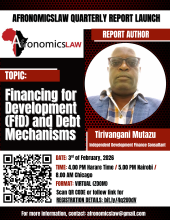Sovereign Debt News Update No. 157: Libya Takes Zimbabwe to UK High Court: The Legal Revival of a 2001 Fuel Credit Dispute
In November 2025, the Government of Libya launched legal action to recover more than US$100 million in unpaid debt from Zimbabwe, adding to the nation’s growing list of creditor disputes as it struggles under a debt burden exceeding US$23 billion. As of September 2025, Zimbabwe's total public and publicly guaranteed debt stock stood at US$23.4 billion, which includes US$13.6 billion in external debt. This update examines Zimbabwe’s renewed sovereign debt challenges through the lens of the ongoing legal dispute with Libya over a US$100 million fuel-related debt originating from a 2001 credit facility, situating the case within Zimbabwe’s broader, long-standing debt crisis and governance weaknesses in public borrowing. The update further explores how the decision by the Libyan Foreign Bank to pursue litigation in the UK High Court reflects wider trends in cross-border sovereign debt enforcement and signals increasing impatience among creditors with unresolved legacy obligations. By connecting the Libyan claim to Zimbabwe’s wider external debt overhang, exclusion from international capital markets, and stalled arrears clearance efforts, the analysis highlights how long-standing sovereign debts continue to constrain fiscal sovereignty, undermine economic recovery, and expose structural weaknesses in debt management.

